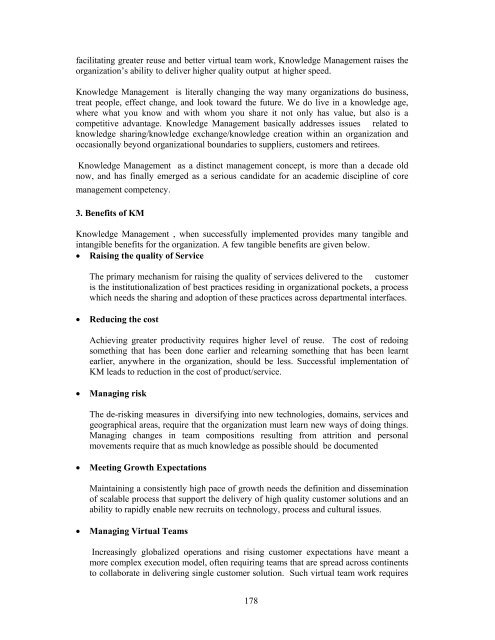7 - Indira Gandhi Centre for Atomic Research
7 - Indira Gandhi Centre for Atomic Research
7 - Indira Gandhi Centre for Atomic Research
Create successful ePaper yourself
Turn your PDF publications into a flip-book with our unique Google optimized e-Paper software.
facilitating greater reuse and better virtual team work, Knowledge Management raises the<br />
organization’s ability to deliver higher quality output at higher speed.<br />
Knowledge Management is literally changing the way many organizations do business,<br />
treat people, effect change, and look toward the future. We do live in a knowledge age,<br />
where what you know and with whom you share it not only has value, but also is a<br />
competitive advantage. Knowledge Management basically addresses issues related to<br />
knowledge sharing/knowledge exchange/knowledge creation within an organization and<br />
occasionally beyond organizational boundaries to suppliers, customers and retirees.<br />
Knowledge Management as a distinct management concept, is more than a decade old<br />
now, and has finally emerged as a serious candidate <strong>for</strong> an academic discipline of core<br />
management competency.<br />
3. Benefits of KM<br />
Knowledge Management , when successfully implemented provides many tangible and<br />
intangible benefits <strong>for</strong> the organization. A few tangible benefits are given below.<br />
• Raising the quality of Service<br />
The primary mechanism <strong>for</strong> raising the quality of services delivered to the customer<br />
is the institutionalization of best practices residing in organizational pockets, a process<br />
which needs the sharing and adoption of these practices across departmental interfaces.<br />
• Reducing the cost<br />
Achieving greater productivity requires higher level of reuse. The cost of redoing<br />
something that has been done earlier and relearning something that has been learnt<br />
earlier, anywhere in the organization, should be less. Successful implementation of<br />
KM leads to reduction in the cost of product/service.<br />
• Managing risk<br />
The de-risking measures in diversifying into new technologies, domains, services and<br />
geographical areas, require that the organization must learn new ways of doing things.<br />
Managing changes in team compositions resulting from attrition and personal<br />
movements require that as much knowledge as possible should be documented<br />
• Meeting Growth Expectations<br />
Maintaining a consistently high pace of growth needs the definition and dissemination<br />
of scalable process that support the delivery of high quality customer solutions and an<br />
ability to rapidly enable new recruits on technology, process and cultural issues.<br />
• Managing Virtual Teams<br />
Increasingly globalized operations and rising customer expectations have meant a<br />
more complex execution model, often requiring teams that are spread across continents<br />
to collaborate in delivering single customer solution. Such virtual team work requires<br />
178
















